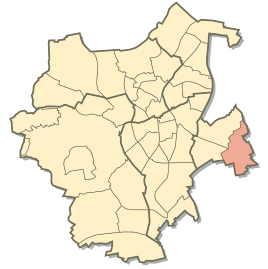Shells
|
Shells
City of Mönchengladbach
|
|
|---|---|
| Coordinates: 51 ° 9 ′ 16 ″ N , 6 ° 31 ′ 8 ″ E | |
| Height : | 56 m |
| Area : | 4.64 km² |
| Residents : | 2097 (December 31, 2018) |
| Population density : | 452 inhabitants / km² |
| Incorporation : | August 1, 1929 |
| Incorporated into: | Gladbach-Rheydt |
| Postal code : | 41238 |
| Area code : | 02166 |
|
Location of Schelsen in the east district of the city of Mönchengladbach
|
|
|
Church of St. Josef in Schelsen
|
|
Schelsen is a district of Mönchengladbach on the Lower Rhine and belongs to the eastern district . Until October 22, 2009, it was an independent district of Mönchengladbach, or a part of the district of Giesenkirchen . Before that, the place belonged to Rheydt , which was incorporated into Mönchengladbach in 1975. On June 30, 2007, Schelsen had 2292 inhabitants, on December 31, 2018 there were 2097 inhabitants.
history
The name Schechtelhausen, from which Schelsen developed, appears in documents as early as the 12th century, around the same time as Giesenkirchen. Schelsen has been mentioned in the documents since 1772. Until the arrival of French troops in October 1794, Giesenkirchen, Zoppenbroich and Horst belonged to the Electorate of Cologne , Dycker-Schelsen to the imperial rule of Dyck . Zoppenbroich included: Bahner, Biesel, Schrödt, Eiger and Junker. Pesch, Leppershütte, Taubenhütte, Stadt, Looshof, Steinhausen and Horster-Schelsen belonged to Horst. Giesenkirchen included the rest of the area of the municipality of the same name. Through the rule of the French, the borders between the previous sovereigns were abolished.
On April 24, 1816, the new district of Gladbach was created , which was part of the Düsseldorf administrative district in the Prussian Rhine province . Until its dissolution on August 1, 1929, the community of Schelsen belonged to the Gladbach district. The mayor of Schelsen as a whole municipality was subdivided into the special municipalities of Giesenkirchen and Schelsen, each of which had its own municipality council. There was a mayor's council for the entire community. Budgets were decided both for the special communities and for the entire community. In the course of the municipal reorganization of the Rhenish-Westphalian industrial area , which the Prussian state parliament decided on July 29, 1929, the cities of Munich-Gladbach , Rheydt and Odenkirchen , as well as the communities of Schelsen and Hardt, became the city of Gladbach on August 1 of the same year -Rheydt formed. On August 1, 1933, the young city was divided up again by order of the Imperial Court in Leipzig .
In the first elections after the Second World War and in all subsequent elections, a decisive number of politicians from Giesenkirchen were elected to the city council of Rheydt. Schelsen was once shaped by agriculture. In 1949 there were 50 farms in Schelsen, today there are only five. Many people lived from the sale of sand that was mined in Liedberg .
In 1974 the North Rhine-Westphalian state parliament in Düsseldorf passed the law to reorganize the Mönchengladbach / Düsseldorf / Wuppertal area. An area change agreement was concluded between the cities of Mönchengladbach / Rheydt and the municipality of Wickrath . This contract also included that the new city of Mönchengladbach was divided into ten boroughs. In addition to the city council for the city as a whole, a district council was set up in each city district. Schelsen was part of the Giesenkirchen district council.
On October 22nd, 2009 the number of boroughs was reduced to four. The districts of the former Giesenkirchen district now belong to the Mönchengladbach Ost district.
politics
The election for the district representation in September 2004 came to the following result:
Frank Boss (CDU) was elected district chairman. Members of the Mönchengladbach City Council from Giesenkirchen have been: Frank Boss (CDU / directly elected in the constituency of Giesenkirchen, Meerkamp, Tackhütte), Axel Zimmermann (CDU / directly elected in the constituency of Giesenkirchen, Schelsen, Ahrener Feld), Horst Peter Vennen (SPD / Ratsreserveliste), Oliver Büschgens (SPD / Ratsreserveliste) and Bernd Püllen (FWG / Ratsreserveliste)
Council members 2009
Giesenkirchen-North: Horst-Peter Vennen (SPD), Giesenkirchen-South: Ralf Kremer (CDU)
From 2004 to 2009 the CDU in Giesenkirchen lost a total of over 50 percent of its voters. Hans-Willi Körfges (SPD) from Giesenkirchen has been a member of the state parliament of North Rhine-Westphalia since the state elections in 2000.
Attractions
- The modern St. Josef Church, built in 1924 and 1938, is a listed building .
Sports
The SV Schelsen is based in the eponymous town.
Web links
- Andreas Gruhn: A village is fighting back . RP Online GmbH. November 8, 2008. Retrieved April 10, 2013.
Individual evidence
- ↑ https://www.moenchengladbach.de/fileadmin/user_upload/statistik/Bevölker_nach_Stadtbezirken_und_Stadtteile__12_2018.pdf
- ^ Village history . Uwe Höveler. Retrieved April 10, 2013.
- ^ City of Mönchengladbach, Department 63, Building Regulations and Monument Protection (Ed.): Monuments list of the city of Mönchengladbach . Mönchengladbach April 24, 2012 ( pb.moenchengladbach.de [PDF; 227 kB ; accessed on October 6, 2012]). pb.moenchengladbach.de ( Memento of the original from October 7, 2014 in the Internet Archive ) Info: The archive link was inserted automatically and has not yet been checked. Please check the original and archive link according to the instructions and then remove this notice.


